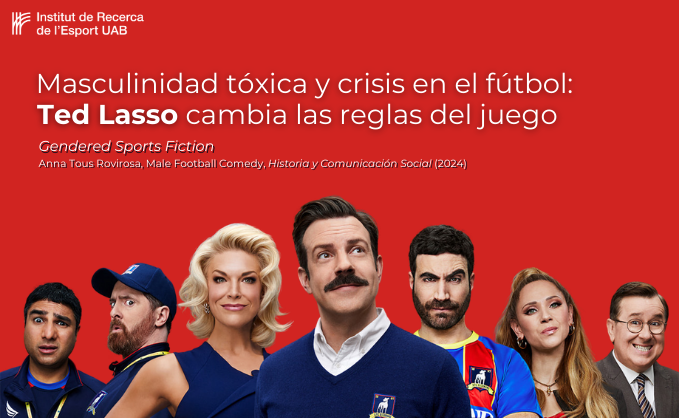Toxic Masculinity and Crisis in Contemporary British Sports Sitcoms. Ted Lasso as a Conciliatory Proposal
Through the research of Anna Tous Rovirosa, focused on British sports sitcoms (2002-2023), which we define as "male football comedy", the representation of male characters in crisis is observed. The American series Ted Lasso emerges as a conciliatory proposal for improving gender relations.

The study’s results, published in Historia y Comunicación Social – Tous Rovirosa (2024), "Male Football Comedy. A Reappraisal of Traditional, Declassed, Toxic Masculinity. Ted Lasso as an Improved Continuation of British Television Sports Series" – explore the causes behind the comic representation of men and their professional and personal failure within a reactionary zeitgeist, which leads to toxic masculinity, in contrast to the cliché of the "bossy woman." These series depict class differences, highlighting the gap between elite football and the working class. The subgenre and its inherent toxic masculinity have been sustained, criticized, and simultaneously legitimized.
The British series Mike Bassett: Manager (ITV, 2005), The Cup (BBC Two, 2008), Rovers (Sky, 2016), and The First Team (BBC One, 2020) are sitcoms produced by major UK television networks that portray the crisis of masculinity, crossing the boundaries of political correctness and opposing the heroic narrative of the almost-warrior protagonist. These “male soap operas”, as defined by Glynn (2018), find their improved version in the American series Ted Lasso (Apple, 2020-2023).
These series are characterized by the adventures and misadventures of protagonists who, for various reasons, do not fit into their professional roles, generating comedy. While British productions tend to oscillate between acidity and misogyny, Ted Lasso, thanks to the show's feel-good tone, notably improves the treatment of stereotypes, particularly by embracing new masculinities and fostering gender solidarity.
The article is part of the project Gendered Sports Fiction, "Gender equality on Sports-Themed Audiovisual Fiction. Insight on stereotypes and psychological dimensions. Women, men and LGTBIQ groups representation", funded by UAB through the precompetitive project grants (PPC23) and led by Anna Tous Rovirosa.